- Home
- David Pilling
The Path of Sorrow Page 13
The Path of Sorrow Read online
Page 13
On a certain night he stood on the platform of the temple, high above the forest canopy, and frowned at the stars. His thoughts preoccupied him so much he did not hear Kayla approach. She walked up behind him and slid her arms around his waist.
“Naiyar,” she whispered, “what has so disturbed your dreams these last few nights?”
Naiyar sighed. “Have you not noticed?”
“I have noticed your silent brooding during the day, and the shifting and muttering in your sleep, but that is all. Tell me.”
“The elephant,” he said and pointed to the sky.
“The constellation? What of it? I have never understood the Djanki obsession with the stars. Even after you showed your people that killing their children didn't send them to an eternal life in the heavens, they still stare at the sky each night. As do you.”
“The stars are still significant, even if they are not what we previously believed them to be. The elephant has been changing shape. I hardly believed it possible. At first I thought it was my imagination, but I have watched it every night for ten nights now, and it is changing.”
“Changing into what?” Kayla stared at where Naiyar's tattooed arm pointed.
“I can't tell yet. It is changing very slowly. Something is happening. My dreams are garbled and I cannot make sense of them, but I feel that powerful forces are at work, and they disturb my consciousness. Ten nights ago I dreamed of a massacre; an entire tribe wiped out. I saw through the eyes of a child, before he was…” Naiyar's voice trailed off.
“Before he was what? Was he killed?” Kayla became more concerned, the playful tone in her voice disappeared, and she came to stand in front of Naiyar, looking into his eyes.
“I don't know, the dream ended. Since then each night I have had a different dream, but all with the same strange feeling, as though my mind is drawn to something and is groping in the dark for it. But it is always just out of reach. I have dreamed of assassinations, bloody battles in strange foreign lands, terrible and impossible storms at sea, men dressed in wolf skins howling at the moon. Last night I saw my brother, Fulk, lying as though dead, his skin grey as the monsoon sky. None of it makes sense. How can all these different things be connected?”
“Remember the Teardrop?” Kayla put a soft, milky hand on each of Naiyar's cheeks and turned his face towards hers. “You learned to set your mind free, to see beyond the restraints of the human mind-state. You have been out of touch since we settled here, your mind has been idle. You need to practice what you learned again.”
Naiyar had first discovered his true identity, with Kayla's help, while meditating on top of the Teardrop, a sacred rock in the desert known as the Southern Sands. There he had mastered his powers and learned to travel the physical and spiritual planes. He knew it was time to use his powers again. He focused on the horizon and tried to clear his mind, hoping the answers would come to him.
* * * *
Colken stood at the bowsprit with this cloak wrapped around him and stared at the line where the ocean met the stars. The ink-black sea seemed to swallow light, like a bottomless void, making the glow of the stars above it almost intolerable.
His people had believed that those stars were their Gods, and that the Gods would plant a child in a Djanki woman's belly once every fifty years. They believed that when they chose that child as a living God and hunted him to his death, he too would become a twinkling light in the night-sky, watching over them for eternity.
That was until the prophet Naiyar had been born. Naiyar was chosen by the tribal shamans as a God and sent into the forest to be hunted. But he raised a storm and destroyed the hunting party, leaving only Colken alive and turning the tribe's ancient beliefs to dust. At the same time he had opened Colken's eyes and made him long to break free of his tribal restraints. Naiyar had woken in Colken a desire to leave the jungle and travel the world, to find adventure, and Naiyar had granted him his freedom. Then Colken had been captured by pirates and forced to serve aboard the Jagged Blade.
Gradually dawn crept into the sky, leaving the heavens a washed out, pale blue. The breeze had dropped, the sea was calm and it felt to Colken as though the cog was stationary, the only movement he could feel was the gentle rocking from side to side. Even the crew was silent. The only sound was the ocean sloshing gently against the hull and the creak of the rigging.
The empty sky weighed heavily on Colken; it seemed to challenge him to prevail, to beat the odds that were stacked against him, find the child and hope the Raven Queen wouldn't kill him regardless. At the same time the vast arch of the sky mocked him by reminding Colken of the empty space in his chest, the space left by his stolen heart.
It dawned on him then that his task was hopeless, for if he delivered an innocent child into the hands of such an insane tyrant, what right did he have to life? What kind of man would that make him? The Djanki had a rough code of honour, and this went against everything he had been raised to believe.
The more he thought about it the angrier he became. He glared at the indifferent sky, as though daring it to rain, and drew strength from his rage.
It occurred to Colken at that moment that the Raven Queen had blundered. She believed she had chosen the right man for her impossible errand: powerful, determined, the greatest warrior she had ever seen. But in her greed and desperation she had over-looked something that, although alien to her, was innate and natural to Colken. He was a warrior, a true warrior, he feared no-one and fought for the simple beliefs he held close. And every time he did so he gladly risked his own life.
The Raven Queen had not sent a huntsman; she had sent a guardian.
Colken smiled as the coast of Temeria surfaced through the gloom, a dark line on the horizon. He resolved to find Sorrow, and if necessary die saving the boy's life. At last he had found what he had been seeking since the prophet Naiyar had opened his eyes to greater possibilities beyond his dank jungle origins. He had acquired a purpose.
As though rewarding him, the sun rose in a cloudless sky, allowing Colken to bask in its rays. He shrugged his cloak off to hang down his back as the fiery globe climbed into the heavens.
At last Captain Grist croaked his order to drop anchor. The two crewmen, lowering a rowing boat over the starboard rail, spoke in hushed tones and avoided looking at Colken. Grist stood looking tense and squinting at him, eager to see the Djanki disappear over the side.
Colken was glad to climb down into the boat. He couldn't help thinking there was something strange about the crew; even a crew ordered not to interact with their passenger would surely have indulged in their usual banter with each other, but Colken's entire journey had been eerily silent.
He settled into the rowing boat and clutched his oars. Then he noticed something that seemed even stranger—the cog appeared to have no name. He had seen many sea-going vessels in the past nine months, but never one without a name picked out on the hull.
Grist and his men watched Colken row towards shore. They seemed to have stopped a long way out, and Colken had to row for some time before the bottom of his boat scraped against sand. He turned to see the sand dunes lining the coast were still some way off, and he had come ashore on a vast beach.
He stepped out of the boat, found that the water was ankle deep, scooped up the rope that hung from the bow, and waded towards the dunes, dragging the vessel behind him.
Up and down the shoreline pure sand stretched away as far as he could see. The dunes rose high above him, obscuring whatever lay beyond, but from what he had heard it was likely to be little different. He had been dropped halfway along the eastern coast of Temeria, south of the spur that jutted east from its centre. According to the map Nurse Lofty had put in his pack, all that lay for miles was desert. Some way to the west was the Burned Earth, a barren waste-land of ash and bones where Sorrow had apparently wandered following the destruction of his people.
Colken couldn't believe a child could survive for long in such an environment but, with no other leads as to where h
e might begin, that was where he had to go.
He trudged up the wet, deserted beach, abandoned the boat at the foot of the steep dunes, and began climbing. His feet sank into the sand, making it hard going, but he eventually reached the top by gripping handfuls of long tussock grass.
Shielding his eyes from the sun he scanned the parched panorama of Eastern Temeria. Between him and the shimmering, dancing horizon was an arid desert, scattered with termite mounds, dry grasses, and the occasional stunted, thorny bush clinging stubbornly to life. The widely spread rocky outcrops provided the only shade.
Colken scrambled down the side of the dune, using his spear to keep his balance, and walked west into the desert. It was mid-afternoon, and Colken strode at a brisk pace, knowing he only had a few hours of daylight. Although he had covered a lot of ground the scenery did not change as he walked; each termite mound, cactus, or lump of rock appeared much the same as the last and Colken encountered no other living thing besides the odd scorpion or line of wandering ants. The afternoon in the desert, when the sun was at its highest, was the time when any living thing with any sense, or choice, would be sheltering beneath a rock or in a burrow, waiting for the coolness of night.
As dusk began to loom he scanned about for an ideal rock to make a fire on. He had no idea what beasts might roam this place at night, but if it was anything like the jungle he would prefer to be on the top of a large rock while he slept. Having spotted something suitable, a mass of red rock with a narrow ledge running along its western face, he climbed its sloping side and settled down with his back to the rock. Nurse Lofty had warned him that night in the desert was bitterly cold, so he made a fire to keep off the chill and ate some of the dried meat the orderly had packed for him. Then he wrapped his cloak about him and studied the stars until he drifted into a deep sleep.
Colken experienced vivid dreams. He dreamed he was searching for something always just out of reach, a frustrating and tiring dream that seemed to go on forever. The strange thing about his dream was that, on the periphery of awareness, he could sense he was also the subject of a questing mind. He felt that someone close to him was tugging at him and repeatedly casting an eye over him, as though they sought something else but kept finding him again by mistake.
Colken awoke at dawn feeling just as tired as he had the night before. He stared at the dying embers of his fire and wondered if his dream meant anything or was simply the result of a bewildering and painful few days.
He sat up, rubbing his eyes and thanking whatever God had granted the small mercy of the rock that sheltered him from the rising sun. He looked west as he chewed a sliver of dried meat and took a swig from his water skin. He could feel the temperature rising, and the horizon was already shimmering and undulating in the heat, making the termite mounds and cacti look like the masts and sails of spectral ships in a gaseous sea. He lay there for some time, gazing at the dream-like mirages, his head woolly from a disturbed night's sleep.
Standing groggily to continue his search, he looked down to see how best to find his way safely to the hard-baked desert soil. The sun was still in the east and, although it was getting higher, there remained a patch of shade on the western side of his rock. He frowned down into that shade, and into the panting face of a scrawny, long-legged dog squinting up at him. The dog sat upright, a permanent grin on its face as its mouth hung open and a long string of drool hung from its lolling tongue.
“What do you want?” Colken snapped. The dog gave no reply, although given the events of the last few days he would not have been altogether surprised if the dog had answered in perfect Djanki. Colken wondered what to do, the dog didn't look aggressive but he couldn't be sure, and the last thing he wanted was to be mauled by a dog before he had made any progress on his journey.
“I'm coming down,” he warned, “and I don't want any trouble, understand?” The dog continued to pant and dribble.
“Right, then. Down I come.”
Colken slowly climbed down from his rock. The dog watched passively, remaining in exactly the same position, but turning its head to follow Colken.
Eventually he dropped from the rock a few paces from the dog. As the beast stood up and padded towards him, he saw that its legs were long, its shoulders coming up to just above Colken's waist. Its paws were broad like a wolf's, as though designed for padding lightly over sand or snow, and looked ridiculous on the end of such skinny legs.
The colour of the dog's coat was unlike any Colken had ever seen. It was silver, almost blue, and its coarse hair grew forwards along its upper back creating a ridge that extended up between its twitchy, erect ears. Its eyes were large and amber, and regarded Colken with a decidedly un-canine calmness he found unsettling.
As Colken considered whether it was a good idea to turn his back on the beast, it cocked its gangly leg and pissed copiously against the rock.
“I see,” said Colken, “your rock. No problem, Blue, it’s all yours.”
Conscious that the sun was rising, shrinking the shadows, he turned back to the west and started marching. The dog waited for a few moments, as if reluctant to leave the rock, and then followed several paces behind Colken. This day was no different than the one before; the landscape slowly floated past him as he walked on and on, the only living thing in sight was the dog that skulked behind.
Apart from stopping to swig his water and throw a piece of dried meat to the dog, Colken did not rest until dusk. He pushed on through the unchanging, sweltering scenery past more cacti and termite mounds, occasionally glancing back to see the dog still following his trail.
He wondered if he should be worried about his stalker's intentions, whether it had a pack stalking him too, just out of sight, waiting for him to tire in the wilderness before devouring him. A small part of Colken enjoyed the company, even if he couldn't be sure if the creature's motives went further than picking up a few scraps from a wandering traveller.
As the sun began to descend on the second day, and Colken was once again studying the area for a suitable resting place, he found a road heading north and south. It was more of a dusty track than a road, but it looked well-worn and he guessed that it had been used recently.
Hoping to meet some passing merchant or trapper who might be able to give him some clue on Sorrow's whereabouts, he headed north along the road a short way, looking for a place where he might sleep for the night. In the absence of a rock the size of the one he had slept on the night before, he propped himself against a boulder and made a fire. The dog had disappeared.
He watched the sky turn from purple to black, then drifted into another sleep filled with frantic battles, endless searching for he knew not what, and the same roving mind, casting about vainly and finding him time and again.
The following morning he woke earlier, eager to get an hour's march on the sun and happy to escape his exhausting, baffling dreams. He stood silently and stretched, then pulled his cloak about his neck and shivered. In the east the sky was just beginning to show the pale wash of dawn, although it would be a while before the sun appeared on the horizon and began to bake the desert and its inhabitants.
He decided continuing north along the road was pointless, better to just head directly for where Sorrow had last been seen and get there as quickly as possible.
As he shouldered his pack ready to set off, he noticed something stir out of the corner of his eye and turned quickly, gripping his spear ready to meet an attack. A second later he dropped his guard and relaxed as he beheld a great maw, yawning wide to show a row of sharp teeth, the ridged roof of its mouth and long tongue hanging limp from one side. The dog let out a high-pitched groan as it stretched, then stood and shook itself, creating a cloud of dust.
“You again,” said Colken, “don't you have a home to go to?”
The dog stretched one more time, trotted across the road and a few paces to the west, then turned and looked at Colken. He shrugged and followed. At least today he would have the dog where he could see it.
; Colken wandered on through the desert, the scenery ever unchanging and the dog remaining his wary travel companion. Gradually the dog walked closer to Colken until on the fifth day it walked by his side. He found himself talking to the dog more each day until he realised he talked to the animal more than he talked to most people.
On the sixth night Colken was disturbed by sounds. The dog had once again disappeared shortly before sundown, and Colken woke in the darkness, hearing voices not far from where he lay. Silently, he crept towards the sound of men having a heated discussion. As he approached, he could see the glow of a fire. Concealing himself behind a rock, he peered over to see a wagon with four horses harnessed to it and a trailer that appeared to be a cage on wheels. He assumed the owner was transporting livestock of some sort. Three other horses were tethered to a thorn bush nearby.
Four men sat around the fire between Colken and the wagon. One sat opposite the others with his back to Colken. They spoke Temerian, a language Colken understood from his time aboard the Jagged Blade.
“You're late, Gloo, you're always fucking late.” One of the three, a large man with a portly belly, a greasy beard, and a surly, crooked mouth pointed his stubby finger at the loner across the fire. “We rode all the way from the High Places to get here because your message insisted you had some top quality merchandise which couldn't wait.” The man he pointed at replied in a sycophantic but insincere tone.
“Yes, int'sting, and how are the High Places?”
“A fucking sight nicer than this toilet, Gloo, now don't waste any more of our fucking time you snivelling little prick.” The second of the three vented his anger, a smaller, sickly looking man with a shaven head and a scar running from his eye to his jawline. The livid scar reflected the firelight, making it look like a river of molten lava running down his cheek.
“You were supposed to be here two nights ago. We've sat here for two fucking days. It’s unbearably hot in the day, freezing at night, and there are some weird noises out here in the dark—some big things moving around by the sound of it. Where in the Hells have you been?”

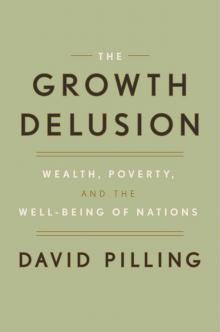 The Growth Delusion
The Growth Delusion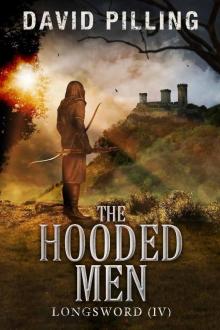 The Hooded Men
The Hooded Men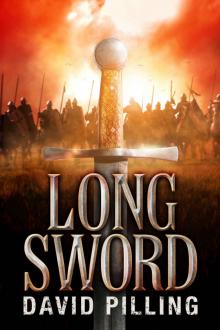 Longsword
Longsword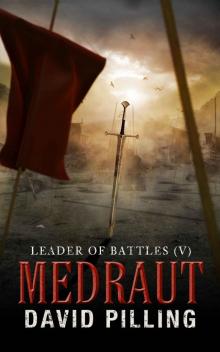 Medraut
Medraut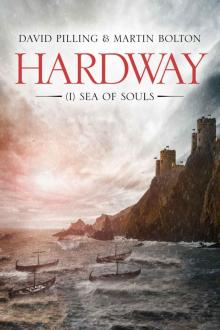 Hardway
Hardway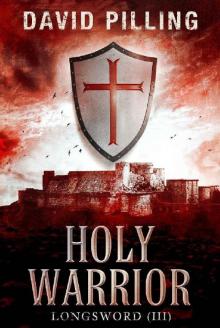 Holy Warrior
Holy Warrior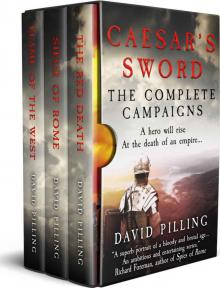 Caesar's Sword: The Complete Campaigns
Caesar's Sword: The Complete Campaigns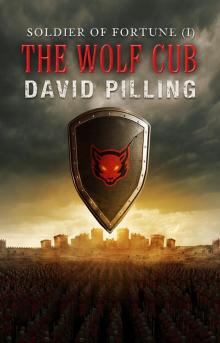 The Wolf Cub
The Wolf Cub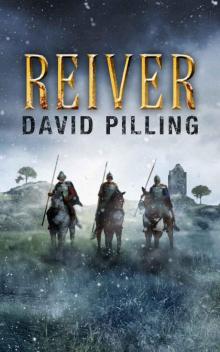 Reiver
Reiver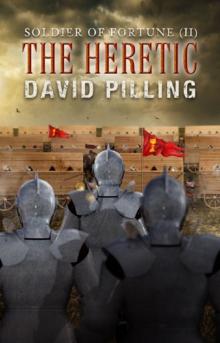 The Heretic
The Heretic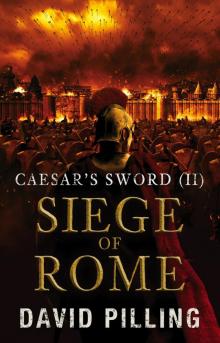 Siege of Rome
Siege of Rome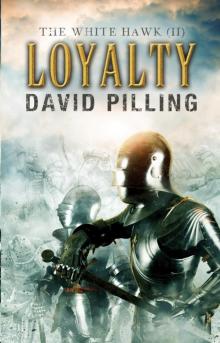 Loyalty
Loyalty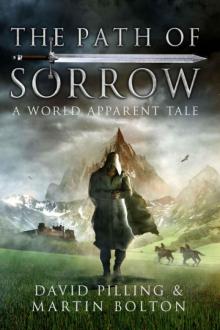 The Path of Sorrow
The Path of Sorrow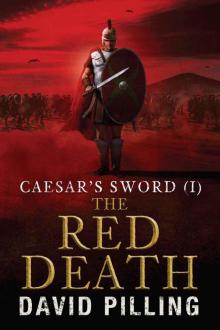 Caesar's Sword (I): The Red Death
Caesar's Sword (I): The Red Death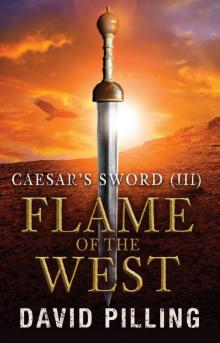 Flame of the West
Flame of the West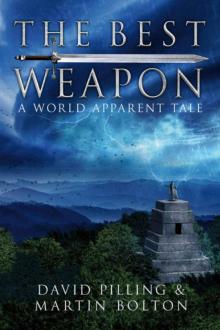 The Best Weapon
The Best Weapon Sacrifice
Sacrifice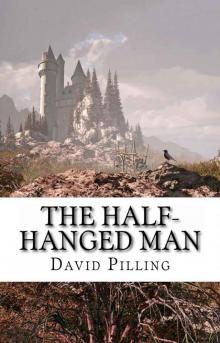 The Half-Hanged Man
The Half-Hanged Man